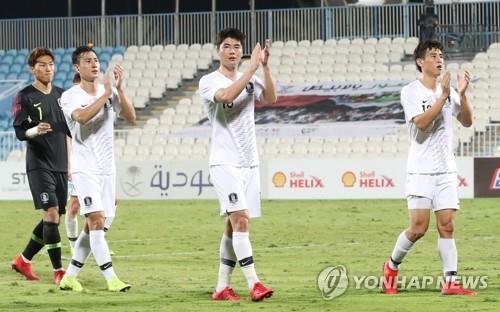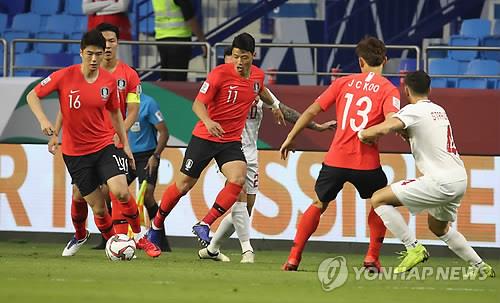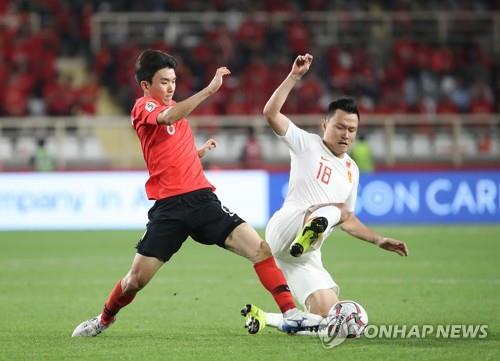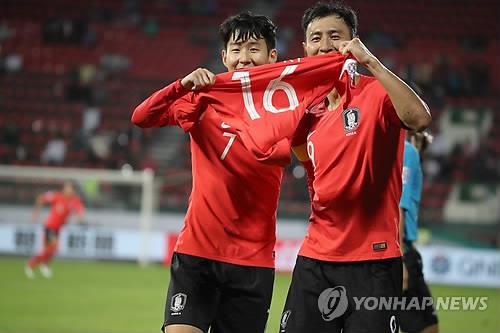- California Assembly OKs highest minimum wage in nation
- S. Korea unveils first graphic cigarette warnings
- US joins with South Korea, Japan in bid to deter North Korea
- LPGA golfer Chun In-gee finally back in action
- S. Korea won’t be top seed in final World Cup qualification round
- US men’s soccer misses 2nd straight Olympics
- US back on track in qualifying with 4-0 win over Guatemala
- High-intensity workout injuries spawn cottage industry
- CDC expands range of Zika mosquitoes into parts of Northeast
- Who knew? ‘The Walking Dead’ is helping families connect
S. Korea football coach tasked with filling void of veteran midfielders
South Korea national football team head coach Paulo Bento has many things to deal with after a disappointing elimination at the 2019 Asian Football Confederation (AFC) Asian Cup, but one specific task will be to fill the void left by two veteran midfielders who decided to end their international careers last month.
After South Korea’s quarterfinals exit at the Asian Cup, Ki Sung-yueng and Koo Ja-cheol announced they will no longer play for the Taeguk Warriors after more than 10 years of service.




This file photo taken Dec. 31, 2018, shows South Korea’s Ki Sung-yueng (C) and Koo Ja-cheol (R) clapping the fans after an international friendly match against Saudi Arabia at Baniyas Stadium in Abu Dhabi, the United Arab Emirates. (Yonhap)
Ki, 30, had hinted at national team retirement after the 2018 FIFA World Cup, but decided to compete until the 2019 AFC Asian Cup at Bento’s request. The Newcastle United midfielder will end his international career with 10 goals in 110 caps.
Koo, who turns 30 next month, said he originally thought about quitting the national team after playing friendly matches in Australia in November. But he also postponed that decision to the Asian Cup following Bento’s persuasion. The FC Augsburg midfielder had 19 goals in 76 caps for South Korea.
Ki and Koo, who both made their international debut in 2008, have been core players for South Korea. In particular, both were pivotal in South Korea’s winning bronze at the 2012 London Olympic Games.
Koo was known for his ball-control skills and attacking abilities in the middle. He was the top scorer at the 2011 Asian Cup.
Ki was South Korea’s midfield orchestrator with his passing skills and vision. He is also a three-time Korea Football Association (KFA) Player of the Year.
At the 2019 Asian Cup, both players’ influence on the pitch was not what it had been in the past. Ki withdrew from the tournament due to a hamstring injury after playing South Korea’s opening match against the Philippines. Koo played four matches, but only started two of them.
Bento has already found one option to cope with Ki’s absence. At the Asian Cup, the Portuguese head coach used Hwang In-beom, a rising playmaker who was integral in South Korea’s gold medal run at the 18th Asian Games in Indonesia last year.
Hwang, who recently joined Vancouver Whitecaps in Canada’s Major League Soccer, is known for his tireless movement, and he can find open space and thread the ball forward. But his work at the Asian Cup resembled a Koo from the past, since Hwang is a more attacking-minded player than Ki.
Ki mainly served as a deep-lying playmaker with the national team, sending long balls to forwards and controlling the tempo of the game. It was his partner Jung Woo-young who took over that role after Ki’s exit. Jung made the most passes of any player at the Asian Cup until South Korea were knocked out by Qatar.
For Koo’s position, Bento has been already using attacking midfielders like Nam Tae-hee and Lee Jae-sung ahead of him. At the Asian Cup, even Son Heung-min was deployed as a central attacking midfielder.
“I think it will not be easy to find their replacements, especially in Ki’s position,” said Hahn June-hea, a football analyst at local broadcasting station KBS. “Bento could overcome this situation by improving his side’s system in general, instead of finding one-on-one replacements for the players.”
Following the departure of Ki and Koo, Some fans are already calling on Bento to use young players like Lee Kang-in and Paik Seung-ho, who both made their Spanish La Liga debuts this year with Valencia and Girona, respectively. But Bento has already said he will not rush the youngsters into action.
“I don’t think a few veterans’ retirements necessarily mean that we have to make a generational shift,” Bento said after returning to South Korea from the Asian Cup. “But I’ll search for new players since we have lots of matches ahead.”
Both Ki and Koo also have been serving as mentors for young players on and off the pitch. Koo was South Korea’s captain at both the 2012 London Olympics and the 2014 World Cup in Brazil. Ki wore the armband from 2015 to 2018, until he passed it to Son.
Players have said it was sad to see Ki and Koo leave the national team, but they are determined to make progress without them.
“We have a couple of players leaving the team, but the remaining players will prepare thoroughly and work hard,” defender Kim Min-jae said.








![일본 사도광산 [서경덕 교수 제공. 재판매 및 DB 금지]](http://www.koreatimesus.com/wp-content/uploads/2024/07/PYH2024072610800050400_P4-copy-120x134.jpg)


